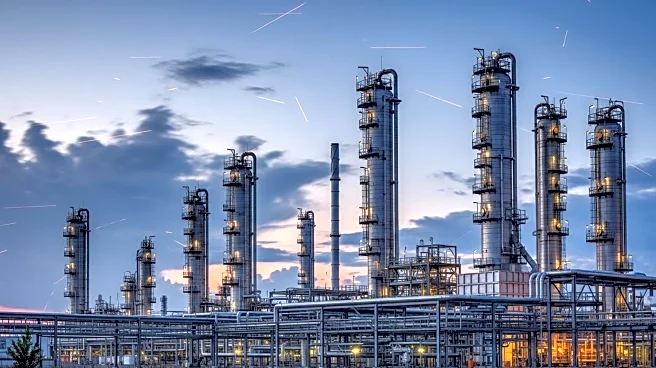What is the story about?
What's Happening?
Ukraine's strategy of targeting Russian oil refineries with drone strikes is significantly impacting Russia's economy. Nearly 40% of Russia's refining capacity is idle due to these attacks, according to Seala, a Russian energy markets analysis agency. This has led to a fuel shortfall, with about 20% of monthly gasoline demand unmet, causing some gas stations to stop selling gasoline. Russia, known for its energy exports, is now importing refined products like gasoline, with imports from Belarus increasing by 36% since July. The Russian government has extended a ban on gasoline and diesel exports to stabilize domestic supply, and Energy Minister Alexander Novak has proposed boosting imports from Belarus and eliminating import duties on gasoline from China, South Korea, and Singapore.
Why It's Important?
The disruption in gasoline production is a significant blow to Russia's economy, which is already strained by military spending and sanctions. The fuel shortage could lead to increased social tension, as gasoline is essential for daily life and economic activities. The Russian government is attempting to balance military expenditures with economic stability, but the increased reliance on imports and potential tax hikes could further strain the economy. The situation highlights the vulnerability of Russia's energy sector to external attacks and the broader economic challenges posed by ongoing military conflicts.
What's Next?
Russia may continue to seek alternative sources of gasoline imports to meet domestic demand. The government might also explore using chemical additives to boost gasoline supply, although this could have environmental and health implications. The ongoing conflict with Ukraine and the associated economic pressures may lead to further adjustments in Russia's fiscal policies, including potential tax increases and changes in social spending. The international community will likely continue to monitor the situation, as it has implications for global energy markets and geopolitical stability.
Beyond the Headlines
The reliance on imports and potential use of banned substances to boost gasoline supply could have long-term environmental and health impacts. Additionally, the economic strain from military spending and sanctions may lead to increased domestic unrest and challenges to the Russian government's ability to maintain public support. The situation underscores the complex interplay between military conflicts, economic policies, and social stability in Russia.
















